Can a discussion or debate on a topic lead to increased understanding and respect among individuals? This question is at the heart of the Filipino culture, where debate is a valued tradition. In the Philippines, debate is not just about winning an argument, but about engaging in a respectful exchange of ideas and opinions.
Experts say that having a discussion or debate on a topic should lead to increased understanding. It’s essential to be open-minded, respectful, and a good listener. This is important in a country where opinions are diverse, with 41% supporting the impeachment rap, 35% opposing it, and 19% undecided.
Key Takeaways
- Debate is a valued tradition in the Filipino culture, promoting respectful exchange of ideas and opinions.
- Discussion and debate can lead to increased understanding and respect among individuals.
- Being open-minded, respectful, and a good listener is essential for effective debate.
- The Philippines has a diverse range of opinions, with 41% of respondents supporting the impeachment rap and 35% opposing it.
- Respectful dialogue is key in a country with a history of debate and discussion.
- Engaging in debate can help individuals develop critical thinking and analytical skills.
The Cultural Significance of Debate in the Philippines
Debate is a big part of Filipino culture. It shows the country’s values of respect and gratitude. The idea of “utang na loob” shows how important it is to be thankful and respectful in relationships. This is seen in how Filipinos have debates.
By sharing their thoughts in a respectful way, people help create a space for open and understanding talks. This is key to building a community that values dialogue and understanding.
In the Philippines, debate is more than just sharing opinions. It’s a way to learn and grow. It helps people think critically and solve problems. This is vital in understanding the complex culture of the Philippines.
The country’s history, shaped by colonialism, also influences how debates are held. Filipinos focus on respectful and open discussions. This shows the value they place on understanding different viewpoints.
- Historical roots: Debate has a rich history in the Philippines, with roots tracing back to the country’s colonial past.
- Influence of colonialism: The influence of colonialism on debate practices in the Philippines has shaped the way Filipinos engage in discussions.
- Debate as a tool for education: Debate is used as a tool for education and personal growth, allowing individuals to develop critical thinking and analytical skills.
Understanding the role of debate in Filipino culture is important. It highlights the value of respectful and open discussions. This helps create a society where everyone can share their thoughts freely and with respect.
Traditional Forms of Debate in Filipino Culture
Debate is a big part of Filipino culture. Forms like balagtasan and pagsasanay show the country’s deep roots in communication and politics.
In the Philippines, balagtasan is a key debate form. It mixes strong arguments with poetic flair. This shows how vital communication is in sharing ideas and views.
Role of Poetry in Debate
Poetry is key in Filipino debates, with balagtasan leading the way. It uses poetic skills to express arguments and opinions. This makes it a special and effective communication tool in politics.
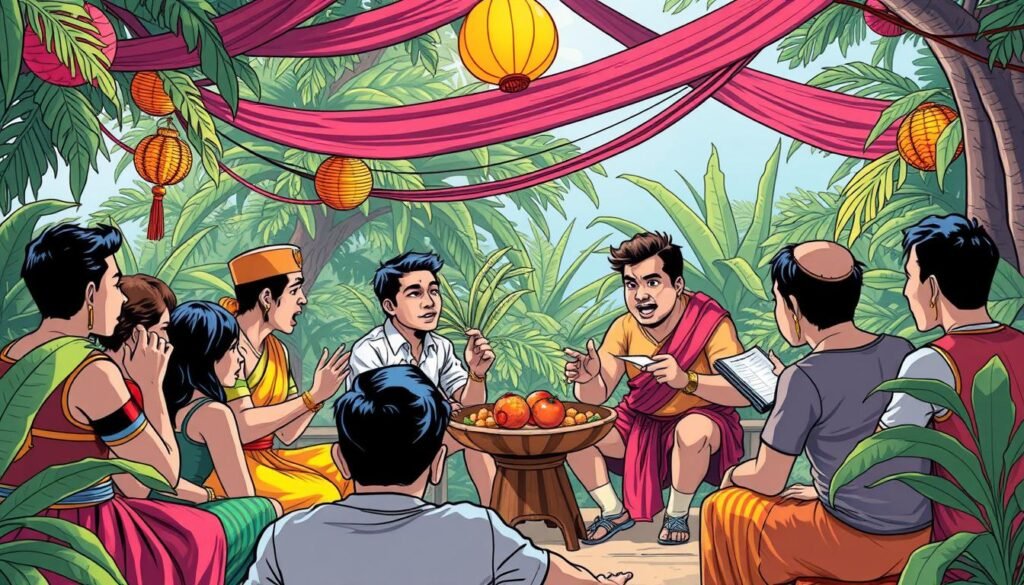
Importance of Indirect Communication
According to the third web source, Filipinos often communicate indirectly. This is to avoid losing face and to show respect. It shows how important indirect communication is in Filipino culture, mainly in politics and debates.
| Traditional Form of Debate | Description |
|---|---|
| Balagtasan | A form of debate that blends persuasive arguments with poetic skills |
| Pagsasanay | A form of rhetorical training in schools that emphasizes the importance of communication and persuasion |
Modern Debate Formats Gaining Popularity
In recent years, new debate formats have become popular in the Philippines. They promote respectful discussion and open-mindedness. One format is parliamentary debate, where teams present arguments on a topic. It’s used in schools to improve critical thinking and public speaking.
Policy debate is another favorite. It involves analyzing policies and their effects on society. Students learn to research deeply and solve problems. For more on respectful dialogue in debate, check out this link.
Modern debate formats have some key features:
- They focus on respectful discussion and being open-minded.
- They emphasize critical thinking and solving problems.
- They help improve public speaking and presentation skills.
By using these formats, schools in the Philippines can foster a culture of respectful discussion. This prepares students for success in their future careers.
The Role of Debate in Filipino Society
Debate is key in Filipino society, helping people get involved and talk respectfully. The idea of utang na loob shows how important it is to be thankful and give back. This idea helps make debates a place where everyone feels valued and respected.
In Filipino culture, debates let people share their views and talk with others nicely. This encourages a society that values open talks and thinking things through. People can share their thoughts freely, without worrying about being judged or punished.
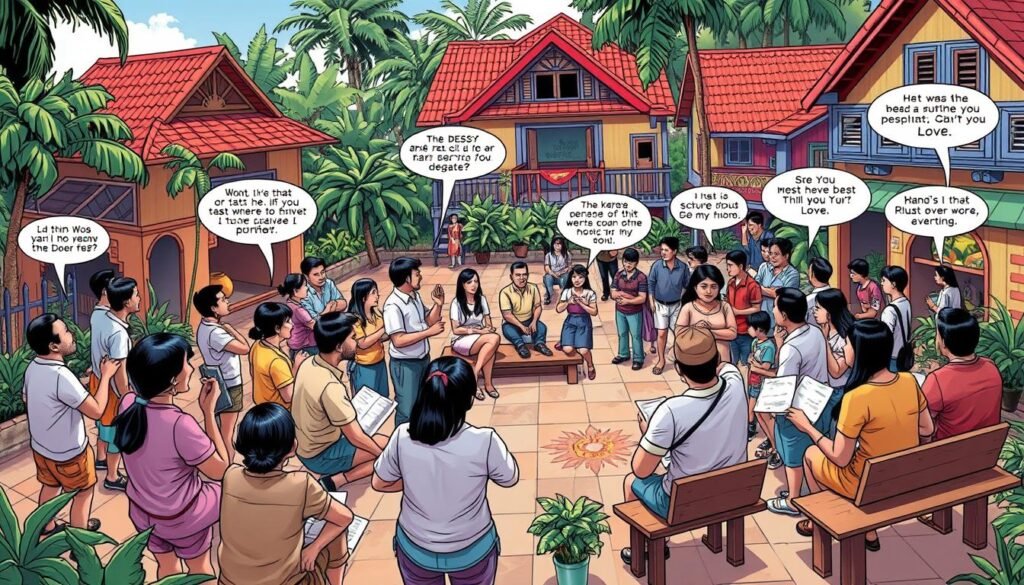
Groups like the Philippine Debate Union (PDU) and the UP Debate Society (UPDS) are big in the Philippines. They help students and young adults learn to speak well and argue effectively. These groups also help build a community where everyone respects each other.
Debates help unite people by encouraging respectful talks. This is why it’s important to keep supporting debate efforts in the Philippines. We should also encourage everyone to have respectful and useful discussions about big issues.
The Skills Acquired Through Debate
Debate is a valuable activity that helps individuals develop essential skills. These include public speaking, critical thinking, and analytical skills. These skills are key in many areas of life, like politics and communication.
By participating in debates, people can get better at sharing their thoughts and opinions. They also learn to have respectful discussions.
Some of the key skills acquired through debate include:
- Enhanced public speaking abilities
- Improved critical thinking and analytical skills
- Effective communication and persuasion techniques
- Increased confidence and self-esteem
These skills are highly valued in many professions, including politics, law, and business. By developing these skills through debate, individuals can become more effective communicators, critical thinkers, and problem solvers.

Debate also helps individuals develop essential life skills. These include teamwork, adaptability, and time management. By working together, debaters learn to rely on each other’s strengths and build on each other’s ideas.
| Skill | Benefit |
|---|---|
| Public Speaking | Enhanced confidence and self-esteem |
| Critical Thinking | Improved analytical and problem-solving skills |
| Communication | Effective persuasion and negotiation techniques |
The Impact of Social Media on Debate Culture
Social media has become a big place for debate and discussion. It lets people share their thoughts and talk to others about many topics. Janell Zeug’s article says that being respectful and open-minded is key in debate, which also applies to social media.
Some important points about social media’s effect on debate culture are:
- It makes it easier for more people to join in debates and talks.
- More topics and issues get discussed, from politics and social justice to entertainment and culture.
- There can be both good and bad interactions, with some users promoting respectful talks and others spreading hate or false information.
As social media keeps changing, it’s important to think about its role in our discussion and debate culture. By encouraging respectful and open-minded talks, we can use social media to make people more informed and involved.
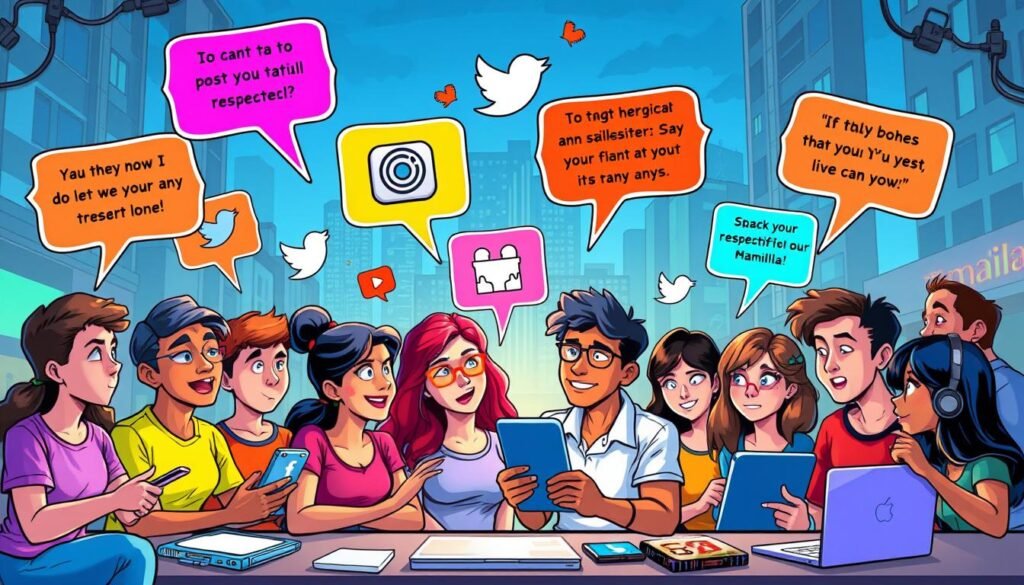
The Influence of Filipino Values in Debate
Filipino values shape how people debate and discuss. The idea of utang na loob, or debt of gratitude, is key. It shows the importance of respecting and repaying those who help us. This value makes Filipinos focus on harmony and avoiding conflict in debates.
In Filipino culture, debates are about sharing opinions and ideas, not just winning. This is because of bayanihan, or community spirit. It teaches us to work together and support each other. This way, debates stay respectful and constructive, even on tough topics.
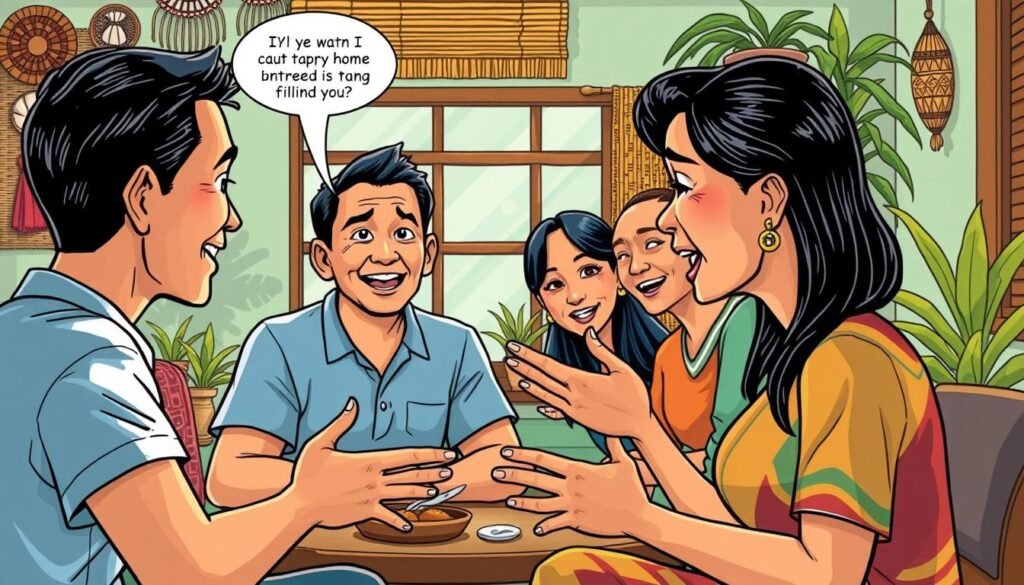
Debates also show Filipino values in how we view authority. In Filipino culture, elders and those in charge are highly respected. Debates focus on listening and learning, not just trying to convince.
Some key aspects of Filipino values in debate include:
- Respect for authority and tradition
- Emphasis on harmony and avoiding conflict
- Importance of utang na loob and repaying debts of gratitude
- Prioritizing community spirit and working together
Educational Institutions Supporting Debate
Debate programs in schools are key for developing critical thinking, communication, and analysis skills. In the Philippines, many schools and universities include debate in their curricula. They see its value in creating well-rounded individuals.
These programs boost public speaking and encourage respectful dialogue. This is vital for politics and civic involvement.
Recent data shows that debate students do better in school. They have better reading scores and graduate more often. The National Association for Urban Debate Leagues notes that over 10,000 students from 20 cities joined debate tournaments last year. This shows the growing interest in debate among Filipino youth.
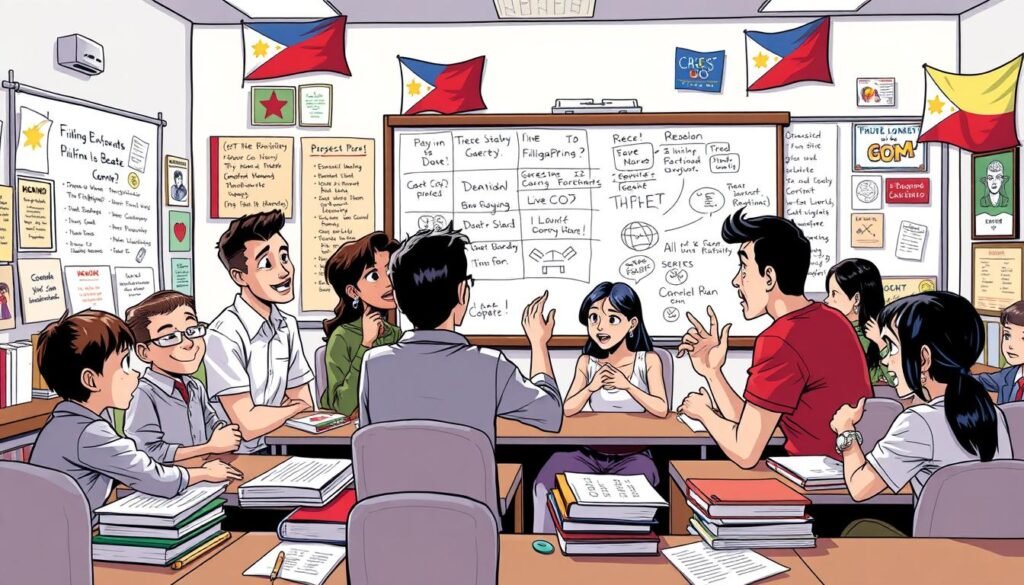
Universities with Debate Programs
Many universities in the Philippines offer debate programs. These give students a chance to practice structured discussions and improve their argument skills. The programs include training, workshops, and competitions.
These help students feel more confident in sharing their views and handling different opinions.
High School Initiatives: Cultivating Young Debaters
High schools are also starting to focus on young debaters. They see the value of debate in developing critical thinking and communication skills early on. Many high schools have debate clubs and teams.
These teams compete in local and national events. This creates a sense of community and healthy competition among students.
| Benefits of Debate Programs | Statistics |
|---|---|
| Improved reading scores | 13% increase |
| Higher graduation rates | 17% increase |
| Increased postsecondary enrollment | 29% increase |
By supporting debate, schools in the Philippines are preparing students for politics and civic engagement. They promote respectful dialogue and open-mindedness.
Representing the Philippines in International Debates
The Philippines is very active in international debates. It talks about many global issues. The United Nations says the Philippines has made many statements at UN sessions.
One example is when the Philippines sent a team to talk about South-South & Triangular Cooperation. The team had 11 people. They also had a roundtable discussion led by NBA legend Julius “Dr. J” Erving. This showed how sports can help in peace talks at the UN.
To learn more about the Philippines’ role in international debates, check out the United Nations website. The Philippines is really committed to peace and understanding worldwide.
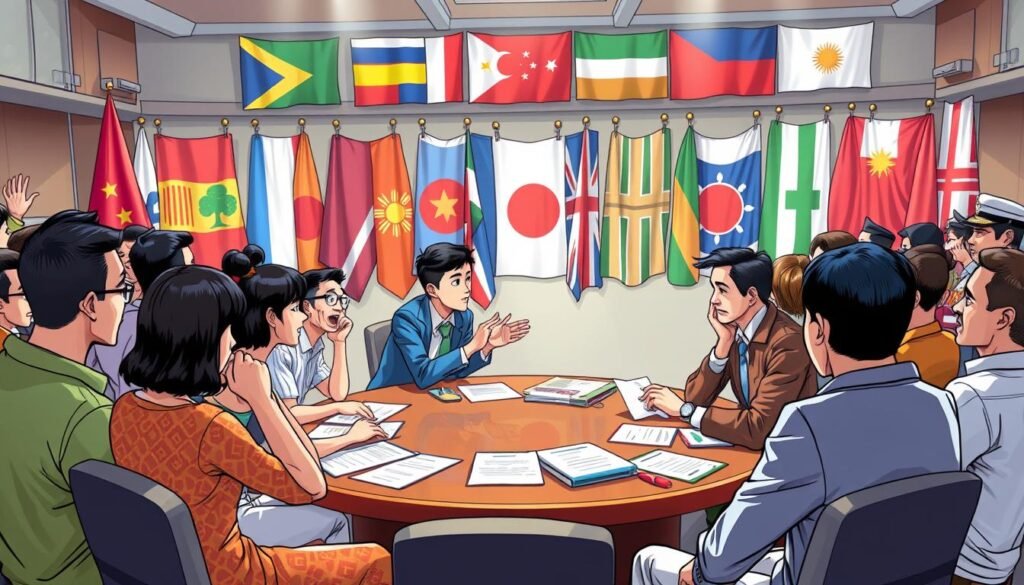
The Philippines also takes part in the World Schools Debating Championships (WSDC). They’ve made it to the semi-finals many times. This event is big for countries where English is not the main language. China and India have even won world titles.
| Year | Participating Teams | Winner |
|---|---|---|
| 1988 | 6 | Australia |
| 1990 | 7 | Scotland |
| 1991 | 8 | England |
The Philippines’ involvement in debates shows its dedication to global understanding and peace.
Embracing Diversity in Debate Topics
Debate topics should show the wide range of opinions and culture in our society. By welcoming this diversity, debaters can tackle today’s issues and question cultural norms. This way, we gain a deeper understanding of various viewpoints and encourage respectful talks.
Engaging with Current Events
Debating about today’s news, like political matters, helps people form well-informed opinions. It also sharpens critical thinking skills. This makes us more active and engaged citizens. Debating current events brings several benefits:
- Improved critical thinking and analytical skills
- Enhanced public speaking and communication abilities
- Increased empathy and understanding of different perspectives
Debating Cultural Norms
Discussing cultural norms, like “utang na loob,” helps us grasp the complexity of culture and its role in society. It leads to a more thoughtful and respectful conversation about cultural matters. By embracing diversity in debate topics, we build a more inclusive and informed community.
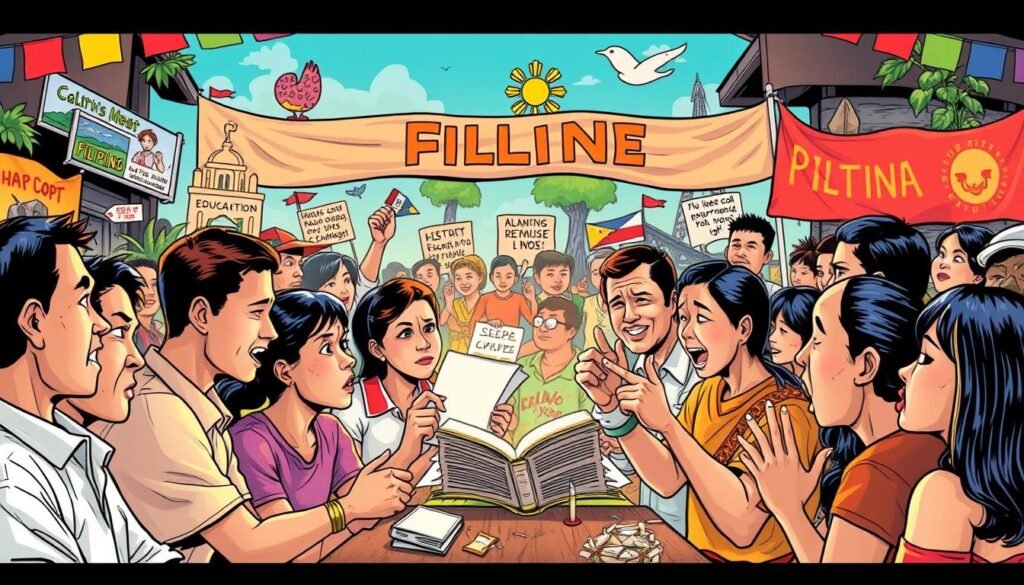
The Future of Debate in the Philippines
The future of debate in the Philippines is linked to embracing the digital age. Urban debates and other forms of discussion are becoming key. It’s vital to teach debate skills to the next generation.
This can be done by using technology in schools. It boosts communication and critical thinking abilities.
In politics, debate shapes public views and guides policy. Teaching debate skills helps future leaders have respectful, informed talks. This leads to better communication and a stronger democracy.

- 50 youth took part in the Mindanao Urban Peace Debates, with teams from MSU-IIT.
- The Manila Urban Debates had 48 participants from 24 teams, with 27 judges.
These events show the rising interest in debate. They highlight the need for strong communication and critical thinking among the youth.
Ethical Considerations in Debating
Debating is more than just winning. It’s about respectful dialogue and being open-minded. Janell Zeug’s article shows how important it is to listen and value everyone’s opinions.
In debates, fairness and inclusivity are key. Everyone should get a chance to share their views. Moderators help keep the discussion respectful and fair. This way, we can all learn more and have a meaningful conversation.
Here are some tips for ethical debating:
- Make sure everyone gets a say.
- Keep the conversation respectful and empathetic.
- Be open to different viewpoints.
By following these tips, we can make debates better. Everyone will feel respected and heard. This leads to a more productive and respectful exchange of ideas.
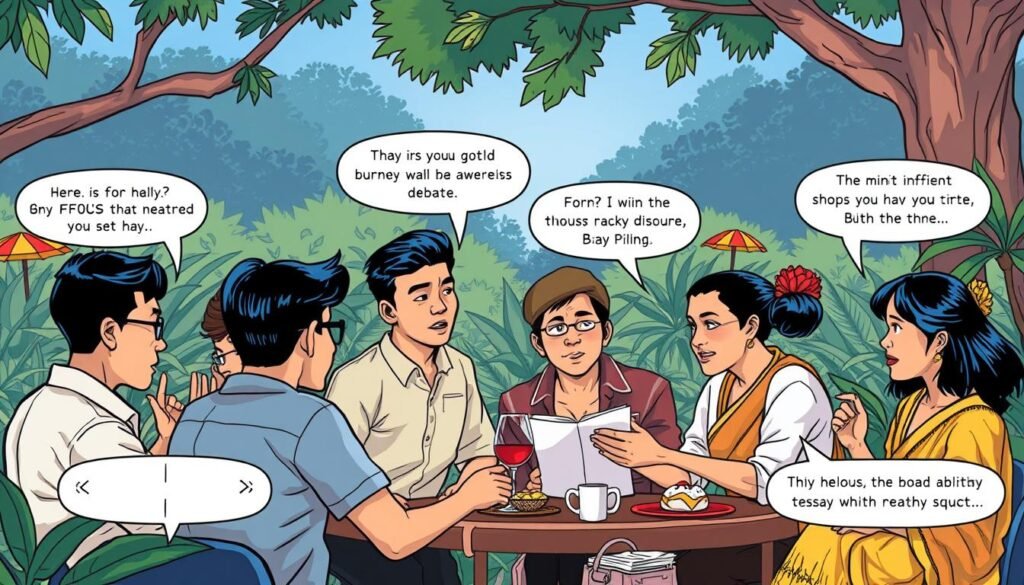
Celebrating National Debate Competitions
National debate competitions are key in promoting opinions and respectful talks. In the Philippines, they unite people from different backgrounds. This encourages them to have constructive talks and share ideas. The infrastructure legacy of past leaders has helped grow debate culture here.
These competitions greatly impact participants. They learn to think critically, communicate well, and work together. Debating helps people sharpen their opinions and express them clearly. This is important in any culture.
The following table shows some big wins in debate competitions:
| Competition | Participants | Achievements |
|---|---|---|
| Citywide Championship | Debaters from at least two schools | Significant increase in retention rate and active participants |
| NSDA National Tournament | 4 teams from Highland Park | Confirmed attendance and notable points earned by participants |

In conclusion, national debate competitions are vital. They promote respectful talks and the exchange of opinions in the Philippines. By joining these events, people can improve their skills and help grow a lively debate culture.
Common Misconceptions About Debate
Many people see debate as just shouting or drama, not as a way to share ideas. In politics and communication, debate is key for shaping opinions and thinking critically. But, wrong ideas about debate can block good communication and getting involved in civic life.
A survey showed 75% of Filipino students think debate skills will help their careers. Also, 82% see debate as vital for being active in civic life. Yet, 60% think debate is only about arguing, showing we need to teach the truth about it.
Good debate is about clear, logical points backed by facts, not just jokes or fancy words. In politics, it helps people disagree respectfully and share ideas. This leads to better choices.
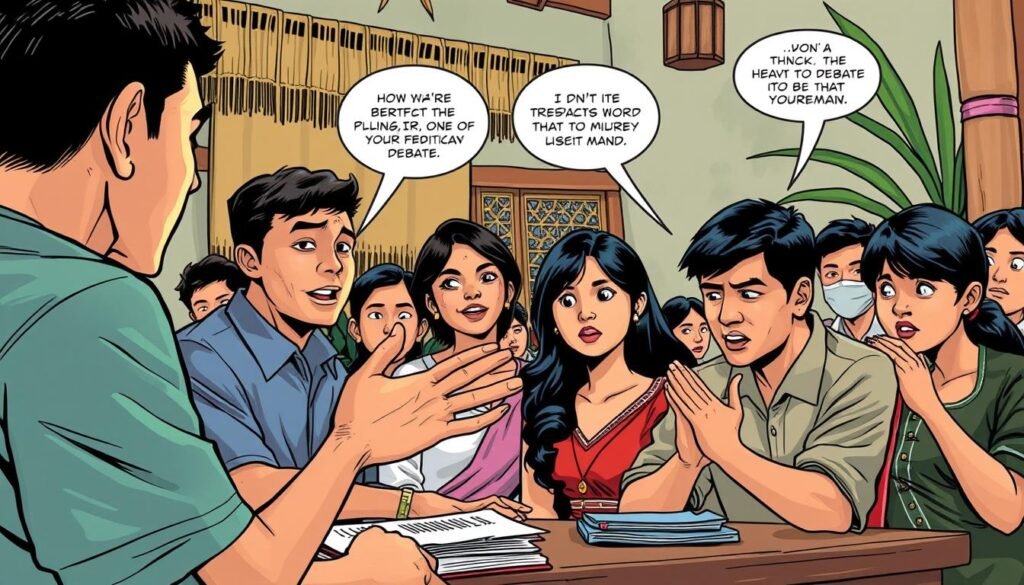
To make debate and communication better, we must clear up wrong ideas. We should focus on respectful disagreement and arguments based on facts. This way, we can build a culture of helpful debate and active citizenship. It will help us make smarter choices and be more involved in our communities.
| Misconception | Reality |
|---|---|
| Debate is solely about winning or losing | Debate is about exchanging ideas and fostering critical thinking |
| Debate is only for politics and current events | Debate can be applied to various topics, including social issues and cultural norms |
| Effective debate relies on stylistic techniques | Effective debate emphasizes clear, logical arguments supported by evidence |
Resources for Aspiring Debaters
Looking to get better at debating? There are many resources out there. Discussion and debate can boost your critical thinking and communication. Websites like mydebateresource.com offer lots of materials and guidance for all levels.
Some great exercises for debaters include “Wordsmith” and “Justify It.” They help improve your argument skills and make your words count. The “Pulled from the Headlines” exercise teaches you to summarize news fast. And “Take Action” challenges you to come up with solutions quickly. You can find these on many online platforms.
Remember, respectful communication is key when debating, as Janell Zeug’s article points out. Focus on discussion and being open-minded. This way, you’ll create a space where ideas can flow freely. Here are some tips for those starting out:
- Practice often to sharpen your critical thinking and communication
- Always be respectful and open-minded in discussion
- Use online resources and platforms for exercises and tools
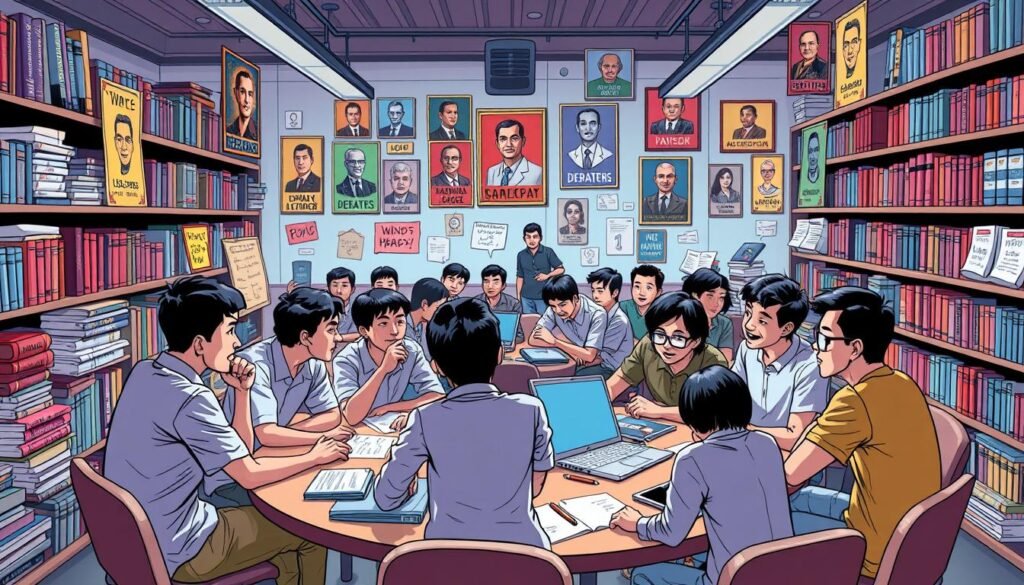
Conclusion: The Future of Respectful Debate in the Philippines
Looking back at the Philippines’ debate tradition, it’s clear that respectful dialogue is more than a cultural value. It’s also key for critical thinking and community involvement. Debating, rooted in , , and , can shape the Philippines’ future.
Encouraging young people to debate can build a culture of respectful talk. Here, different are valued, and discussions are constructive. The Filipino idea of “utang na loob” helps foster mutual understanding and teamwork among debaters.
The Philippines must keep its focus on debate’s core values in the digital age. These include critical thinking, ethical reasoning, and clear communication. By sticking to these, the country can keep at the heart of its democracy and society.
FAQ
What is the cultural significance of debate in the Philippines?
Debate in the Philippines is deeply rooted in history and values. It’s about respect and gratitude. It helps in education, personal growth, and civic engagement. It shows the importance of respectful communication and open-mindedness in Filipino culture.
What are some traditional forms of debate in Filipino culture?
In the Philippines, traditional debates include balagtasan, the art of poetic debate. There’s also pagsasanay, which is rhetorical training in schools. These highlight the role of poetry, rhetoric, and indirect communication in Filipino culture.
How are modern debate formats, such as parliamentary and policy debate, gaining popularity in the Philippines?
Modern debate formats like parliamentary and policy debate are gaining popularity. They encourage critical thinking, respectful dialogue, and diverse opinions. This makes them appealing in the Philippines.
What is the role of debate in Filipino society?
Debate is a way for Filipinos to engage in civic activities. It brings people together and builds community. It shows the value of respectful discourse and “utang na loob” (debt of gratitude) in Filipino relationships.
What skills are acquired through participating in debate?
Debating improves public speaking, critical thinking, and analytical skills. These skills are valuable in life, including politics and communication. They are key in Filipino culture, which values indirect communication.
How has social media impacted debate culture in the Philippines?
Social media has changed debate culture in the Philippines. It offers a new platform for discussion but also presents challenges. It can promote critical thinking and civic engagement but requires careful digital communication.
How do Filipino values influence the way Filipinos engage in debate?
Filipino values like bayanihan (community spirit) and respect for elders shape debate. The concept of “utang na loob” also influences how Filipinos interact during debates.
What is the representation of the Philippines in international debate competitions?
Filipino debaters have made a mark globally, representing the country’s values. They face challenges but show the importance of respectful communication.
What are some common misconceptions about debate in the Philippines?
Misconceptions include confusing drama with debate and misunderstanding aggression in discourse. Education and awareness can help promote respectful debate.
What resources are available for aspiring debaters in the Philippines?
Online platforms, tools, and readings help aspiring debaters in the Philippines. They can develop skills and participate in respectful discourse. These resources foster a sense of community and promote critical thinking and communication.
Source Links
- Understanding ‘utang na loob’ – https://opinion.inquirer.net/159721/understanding-utang-na-loob
- PDF – https://ijhss.net/index.php/ijhss/article/viewFile/769/246
- Giving Opinions – https://www.teach-this.com/functional-activities-worksheets/giving-opinions
- The First Philippine Question · The Philippines and the University of Michigan, 1870-1935 · Philippines – https://philippines.michiganintheworld.history.lsa.umich.edu/s/exhibit/page/the-first-philippine-question
- Debate – https://en.wikipedia.org/wiki/Debate
- Debate on the date and place of 1896 ‘Cry’ for PH freedom – https://www.pna.gov.ph/opinion/pieces/739-debate-on-the-date-and-place-of-1896-cry-for-ph-freedom
- The Art of Filipino Persuasion: Terms for Debate and Rhetoric – https://fluentfilipino.com/the-art-of-filipino-persuasion-terms-for-debate-and-rhetoric/
- History of argumentation and debate – https://www.slideshare.net/slideshow/history-of-argumentation-and-debate/69715436
- intro | Third World Studies Center – https://twsc.upd.edu.ph/debate-philippine-left-review/debate-intro/
- Formats of Debate – http://www.csun.edu/~dgw61315/debformats.html
- World Schools Debate Format | better – https://betterdebatemanual.wixsite.com/better/wsdc
- Philippine Debate Union – https://phdebate.wordpress.com/
- UP Debate Society – https://iskomunidad.upd.edu.ph/index.php?title=UP_Debate_Society
- The Power of Speech & Debate Education : Stanford National Forensic Institute – https://snfi.stanford.edu/skills
- 5 Essential Life Skills You’ll Learn From Debate – Vancouver Debate Academy – https://vancouverdebate.ca/portfolio/5-essential-life-skills-youll-learn-from-debate/
- Essential Debate Skills: What Every Debater Needs to Have in Their Toolbox – https://www.theglobalcitizenacademy.com/blog/essential-debate-skills-what-every-debater-needs-to-have-in-their-toolbox
- Social Media | Pros, Cons, Debate, Arguments, Facebook, Twitter, Linkedin, & Internet Addiction | Britannica – https://www.britannica.com/procon/social-media-debate
- The Social Media Debate: Unpacking the Social, Psychological, and Cultural Effects of Social Media – https://www.routledge.com/The-Social-Media-Debate-Unpacking-the-Social-Psychological-and-Cultural-Effects-of-Social-Media/Rosen/p/book/9780367767518?srsltid=AfmBOortIky2xsDypotyQFfel64hgMETTGwfnM5X7jkXfhp9c395m6eb
- Filipino values – https://en.wikipedia.org/wiki/Filipino_values
- Hala bira! Halalan! Cultural Lessons from Philippine Elections – Department of Anthropology – https://anthro.upd.edu.ph/hala-bira-halalan-cultural-lessons-from-philippine-elections/
- Resolved: Debate Programs Boost Literacy and College Enrollment – https://www.educationnext.org/resolved-debate-programs-boost-literacy-and-college-enrollment/
- Using Debate as an Educational Tool – https://www.edutopia.org/article/using-debate-educational-tool/
- Mission Activities | Philippines Permanent Mission to the United Nations – https://www.un.int/philippines/mission-activities
- World Schools Debating Championships – https://en.wikipedia.org/wiki/World_Schools_Debating_Championships
- 20 Thought-Provoking Questions About Diversity & Inclusion – https://www.coffeepals.com/blog/20-thought-provoking-questions-about-diversity-inclusion
- How can you ensure all voices are heard during a debate? – https://www.linkedin.com/advice/1/how-can-you-ensure-all-voices-heard-during-debate-0ciuc
- Urban Debate Opens: Hearing the Future of Cities Speak — UN-Habitat Philippines – https://unhabitat.org.ph/stories/hearing-future-cities-speak/
- Five big issues for the education debate in 2023 – ProFuturo – https://profuturo.education/en/observatory/trends/five-big-issues-for-the-education-debate-in-2023/
- #ProudViscan debaters triumph in another regional debate spar – https://www.vsu.edu.ph/articles/news/2564-viscan-debaters-triumph-in-another-regional-debate-spar
- Discussion Tools: Debates | Online Ethics – https://onlineethics.org/cases/resources-research-ethics-education/discussion-tools-debates
- Debating Debate – Ethics Unwrapped – https://ethicsunwrapped.utexas.edu/debating-debate
- No title found – https://www.speechanddebate.org/national-speech-debate-education-day/
- Celebrating Fierce & Friendly Competition at the Citywide Championship – Minnesota Urban Debate League – https://mnudl.augsburg.edu/celebrating-fierce-friendly-competition-at-the-citywide-championship/
- Style or substance? – https://www.debatingforeveryone.com/resources/how-to-debate/style-or-substance
- Top Ten Debate Myths – https://www.cbsnews.com/news/top-ten-debate-myths/
- What we’re debating when we debate “misconceptions” – https://notepad.michaelpershan.com/a-brief-note-on-misconceptions/
- Resource 13: Debate Skill Drills and Warm-Ups | The Practice Space – https://www.practice-space.org/debate_guide/resource-13-debate-skill-drills-and-warm-ups/
- Improving your argumentation – https://www.debatingforeveryone.com/resources/training-activities/improving-your-argumentation
- Key factors in Debating Matters – what and who you need – https://debatingmatters.com/key-factors-in-debating-matters-what-and-who-you-need/
- Debate – https://www.slideshare.net/slideshow/debate-82150907/82150907
- 10 Conclusions, Recommendations, and Research Questions | Science and Engineering for Grades 6-12: Investigation and Design at the Center – https://nap.nationalacademies.org/read/25216/chapter/12
- Debate: Is Change Always A Good Thing – https://www.ineos.com/inch-magazine/articles/issue-8/debate-is-change-always-a-good-thing/

